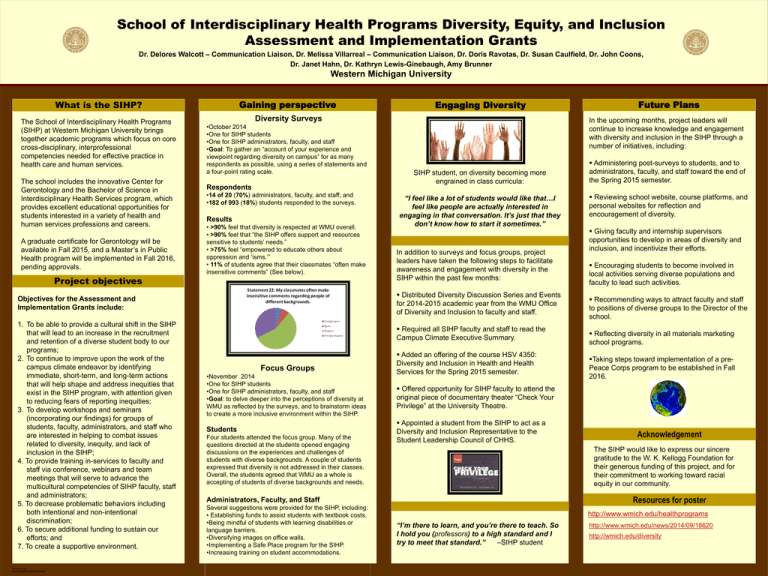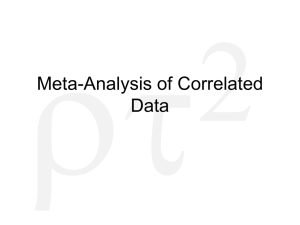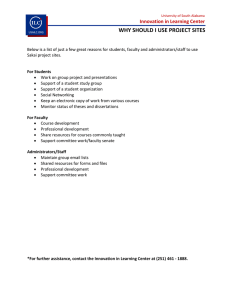School of Interdisciplinary Health Programs Diversity, Equity, and Inclusion
advertisement

School of Interdisciplinary Health Programs Diversity, Equity, and Inclusion Assessment and Implementation Grants Dr. Delores Walcott – Communication Liaison, Dr. Melissa Villarreal – Communication Liaison, Dr. Doris Ravotas, Dr. Susan Caulfield, Dr. John Coons, Dr. Janet Hahn, Dr. Kathryn Lewis-Ginebaugh, Amy Brunner Western Michigan University Gaining perspective What is the SIHP? The School of Interdisciplinary Health Programs (SIHP) at Western Michigan University brings together academic programs which focus on core cross-disciplinary, interprofessional competencies needed for effective practice in health care and human services. The school includes the innovative Center for Gerontology and the Bachelor of Science in Interdisciplinary Health Services program, which provides excellent educational opportunities for students interested in a variety of health and human services professions and careers. A graduate certificate for Gerontology will be available in Fall 2015, and a Master’s in Public Health program will be implemented in Fall 2016, pending approvals. Project objectives Diversity Surveys •October 2014 •One for SIHP students •One for SIHP administrators, faculty, and staff •Goal: To gather an “account of your experience and viewpoint regarding diversity on campus” for as many respondents as possible, using a series of statements and a four-point rating scale. Respondents •14 of 20 (70%) administrators, faculty, and staff; and •182 of 993 (18%) students responded to the surveys. Results • >90% feel that diversity is respected at WMU overall. • >90% feel that “the SIHP offers support and resources sensitive to students’ needs.” • >75% feel “empowered to educate others about oppression and ‘isms.’” • 11% of students agree that their classmates “often make insensitive comments” (See below). TEMPLATE DESIGN © 2008 www.PosterPresentations.com SIHP student, on diversity becoming more engrained in class curricula: “I feel like a lot of students would like that…I feel like people are actually interested in engaging in that conversation. It’s just that they don’t know how to start it sometimes.” In addition to surveys and focus groups, project leaders have taken the following steps to facilitate awareness and engagement with diversity in the SIHP within the past few months: Required all SIHP faculty and staff to read the Campus Climate Executive Summary. Focus Groups •November 2014 •One for SIHP students •One for SIHP administrators, faculty, and staff •Goal: to delve deeper into the perceptions of diversity at WMU as reflected by the surveys, and to brainstorm ideas to create a more inclusive environment within the SIHP. Students Four students attended the focus group. Many of the questions directed at the students opened engaging discussions on the experiences and challenges of students with diverse backgrounds. A couple of students expressed that diversity is not addressed in their classes. Overall, the students agreed that WMU as a whole is accepting of students of diverse backgrounds and needs. Added an offering of the course HSV 4350: Diversity and Inclusion in Health and Health Services for the Spring 2015 semester. Administering post-surveys to students, and to administrators, faculty, and staff toward the end of the Spring 2015 semester. Reviewing school website, course platforms, and personal websites for reflection and encouragement of diversity. Giving faculty and internship supervisors opportunities to develop in areas of diversity and inclusion, and incentivize their efforts. Encouraging students to become involved in local activities serving diverse populations and faculty to lead such activities. Recommending ways to attract faculty and staff to positions of diverse groups to the Director of the school. Reflecting diversity in all materials marketing school programs. Taking steps toward implementation of a prePeace Corps program to be established in Fall 2016. Offered opportunity for SIHP faculty to attend the original piece of documentary theater “Check Your Privilege” at the University Theatre. Appointed a student from the SIHP to act as a Diversity and Inclusion Representative to the Student Leadership Council of CHHS. Acknowledgement The SIHP would like to express our sincere gratitude to the W. K. Kellogg Foundation for their generous funding of this project, and for their commitment to working toward racial equity in our community. Resources for poster Administrators, Faculty, and Staff Several suggestions were provided for the SIHP, including: • Establishing funds to assist students with textbook costs. •Being mindful of students with learning disabilities or language barriers. •Diversifying images on office walls. •Implementing a Safe Place program for the SIHP. •Increasing training on student accommodations. Future Plans In the upcoming months, project leaders will continue to increase knowledge and engagement with diversity and inclusion in the SIHP through a number of initiatives, including: Distributed Diversity Discussion Series and Events for 2014-2015 academic year from the WMU Office of Diversity and Inclusion to faculty and staff. Objectives for the Assessment and Implementation Grants include: 1. To be able to provide a cultural shift in the SIHP that will lead to an increase in the recruitment and retention of a diverse student body to our programs; 2. To continue to improve upon the work of the campus climate endeavor by identifying immediate, short-term, and long-term actions that will help shape and address inequities that exist in the SIHP program, with attention given to reducing fears of reporting inequities; 3. To develop workshops and seminars (incorporating our findings) for groups of students, faculty, administrators, and staff who are interested in helping to combat issues related to diversity, inequity, and lack of inclusion in the SIHP; 4. To provide training in-services to faculty and staff via conference, webinars and team meetings that will serve to advance the multicultural competencies of SIHP faculty, staff and administrators; 5. To decrease problematic behaviors including both intentional and non-intentional discrimination; 6. To secure additional funding to sustain our efforts; and 7. To create a supportive environment. Engaging Diversity http://www.wmich.edu/healthprograms “I’m there to learn, and you’re there to teach. So I hold you (professors) to a high standard and I try to meet that standard.” –SIHP student http://www.wmich.edu/news/2014/09/18620 http://wmich.edu/diversity

